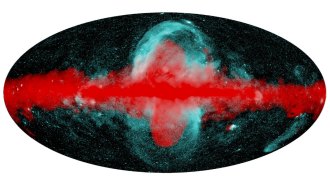Physics
Sign up for our newsletter
We summarize the week's scientific breakthroughs every Thursday.
-
 Physics
Physics‘Fundamentals’ shows how reality is built from a few basic ingredients
In ‘Fundamentals,’ physics Nobel laureate Frank Wilczek shares essential lessons from physics.
-
 Math
MathHow one physicist is unraveling the mathematics of knitting
Understanding how knots influence textile properties could lead to bespoke materials.
-
 Tech
TechA robot arm toting a Venus flytrap can grab delicate objects
By attaching electrodes to the plant’s leaves, researchers found a way to snap its traps shut on command.
-
 Physics
Physics50 years ago, scientists poked holes in the existence of polywater
In 1971, scientists were casting doubt on an anomalous form of water. Fifty years later, water’s odd properties are still mysterious.
-
 Physics
PhysicsExplore every gravitational wave event spotted so far
This interactive visualization reveals the diversity of smashups that generate gravitational waves.
By Emily Conover and Nadieh Bremer -
 Quantum Physics
Quantum PhysicsDrones could help create a quantum internet
Flying drones sent entangled particles of light to two locations a kilometer apart.
-
 Chemistry
ChemistryThis weird chemical bond acts like a mash-up of hydrogen and covalent bonds
Chemistry students are taught that hydrogen bonds and covalent bonds are distinct, but a new study shows they exist on a continuum.
-
 Astronomy
AstronomyEnormous X-ray bubbles balloon from the center of the Milky Way
Images from the the eROSITA telescope reveal X-ray–emitting blobs surrounding gamma-ray bubbles.
-
 Quantum Physics
Quantum PhysicsThe new light-based quantum computer Jiuzhang has achieved quantum supremacy
A second type of quantum computer has now performed a calculation impossible for a traditional computer.
-
 Physics
PhysicsNewton’s groundbreaking Principia may have been more popular than previously thought
A search has uncovered over 300 copies of Isaac Newton’s famous 17th century book, the Principia, revealing a broader readership than assumed.
-
 Physics
PhysicsSupercooled water has been caught morphing between two forms
A new experiment used ultrafast techniques to reveal high-density water transforming into low-density water at subfreezing temperatures.
-
 Physics
PhysicsGiant lasers help re-create supernovas’ explosive, mysterious physics
For the first time, scientists have re-created a type of shock wave that occurs in supernovas.